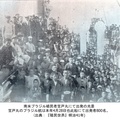The history of Japanese immigration to Brazil will mark exactly 100 years in 2008, so in order to get a rough idea of the history, there are two figures that are useful to know: approximately 250,000 and approximately 1.5 million.
The figure of about 250,000 is the total number of Japanese who immigrated to Brazil. If we divide it into pre-war and post-war periods, it comes to about 190,000 and 60,000, respectively.
The number of people, about 1.5 million, is considered to be the current population of Japanese people in Brazil. The reason for this is that no proper survey has been conducted. 1.5 million is equivalent to the population of Yamaguchi Prefecture in Japan, but it is less than 1% of the total population of Brazil. Incidentally, the most advanced generation of Japanese people today are considered to be sixth generation boys.
Another figure that has been much talked about recently is the figure of about 300,000 - this is also a number - referring to the number of Japanese Brazilians who have gone to Japan to "seek work." It is an expression that is often heard these days that the number of people currently working in Japan far exceeds the number who went to Brazil as immigrants.
Although they look the same as Japanese people, their lifestyle is completely Brazilian, which can cause friction between them and Japanese people. Some Japanese feel uneasy about the number of Japanese Brazilians gathering in one area. This often leads to conflicts and disturbances. After all, with a population of 300,000, crimes do occur. The media focuses on violent crimes and accidents, reporting them as crimes committed by Japanese Brazilians. The phenomenon of Japanese workers migrating to other countries is a major issue for both Brazil and Japan.
On the other hand, of course, moving an entire family overseas or living apart for an extended period of time is a major event in the family's history. Although they are not the sort of thing that would make the news, each family has their own stories related to their migrant work. There are sad stories, but there are also good ones. What I would like to introduce to you now is a story that is a bit like a drama.
KA had a plan to do as soon as she retired: go to Japan and search for her missing son.
About 10 years ago, KA and her son went to Japan to work. A few years later, when they were about to return to Brazil, KA said she wanted to see other towns and earn some more money before returning home, so her son decided to stay behind in Japan.
Among the Japanese Brazilians who are working in Japan, there is a network for exchanging information about what kind of jobs are available and where. Many people rely on the information they get from this network to move to a job with better conditions. After returning to Brazil and starting a new business in her hometown, KA received news from her son that he was moving to a town in western Japan. He thought she would be able to find a good job there.
After that, I never heard from my son again. Six months passed, then a year, then two years. I could no longer be carefree and think that no news was good news. I contacted acquaintances to ask about his whereabouts, but I couldn't find a single clue. Something must have happened to him after he quit his previous job and before he found another. That's what it's like to be in Japan with nothing but the clothes on your back. No matter how small Japan may be, if you get caught up in an incident in a new town before you've made friends, traces of a single person can easily disappear.
Perhaps he had been caught up in an incident connected to the underworld. That was what people around him had started to think. It was not an impossible story. Mr. K. ignored the story, but as time passed, his wife finally accepted it, and from that point on, he began to get sick.
KA didn't have such strong convictions. The possibility that her son was still alive may not have been high. Still, she had decided that once she retired and had the time, she would go to Japan to look for her son.
Ten years have passed. If he stays healthy, his son will be over 30 years old. K.A.'s retirement age is not far off.
It takes about seven hours by bus from the state capital to KA's rural town. The long-distance bus terminal is about a ten-minute walk from KA's house.
One day, after finishing her business in town, KA-san walked past the bus stop on her way home. In the distance, she saw passengers getting off a bus that had just arrived from the state capital. Some people were embracing each other in joy at their reunion. It was a common sight. A young man who had just returned from Japan got off the bus. It was obvious from his clothes.
As she started walking from the bus stop towards the residential area where her house was, she noticed a young man who had just gotten off the bus and seemed to be returning from work coming up behind her. There was no one there to greet her, and in fact he seemed unfamiliar with the town, walking around checking out the scenery here and there. He walked in a similar manner to KA, and it seemed like they were heading in the same direction. KA approached him and asked, "Where are you going?" The young man gave a strange answer: "I think my house was around here."
"Even though we were talking right next to each other, I didn't recognize my son. But it was the same for him. My son didn't recognize me either."The punchline of the story is that when she went to the house the young man was looking for, it turned out to be her own house.
KA's son had an accident with a car belonging to a friend he had just met near the town where he had just started living. The story is like something out of a suspense novel from two decades ago, but he lost his memory after hitting his head hard, and although his injuries healed, he was unable to remember who he was and started living and working in Japan. However, as time passed, his memory slowly returned. Then, somehow or other, he took a vacation when he felt like he could reach his hometown, and he ended up here.
KA must have told this story many times to many people. The way she tells it makes me think she always has a look of deep contentment on her face.
The son, who has a responsible job in Japan, returned to Japan after just two weeks.
Of course, KA plans to visit his son as soon as he retires.
© 2008 Shigeo Nakamura










